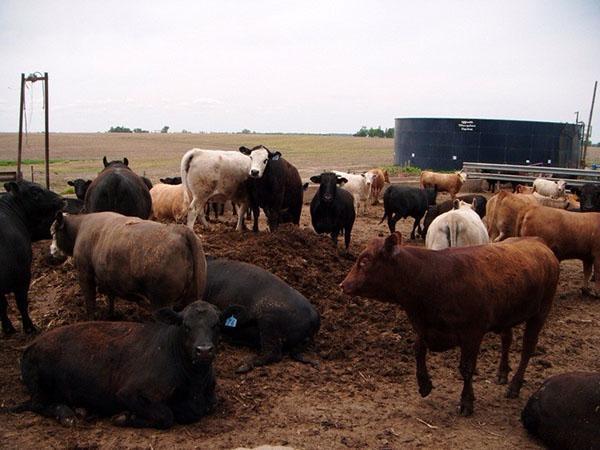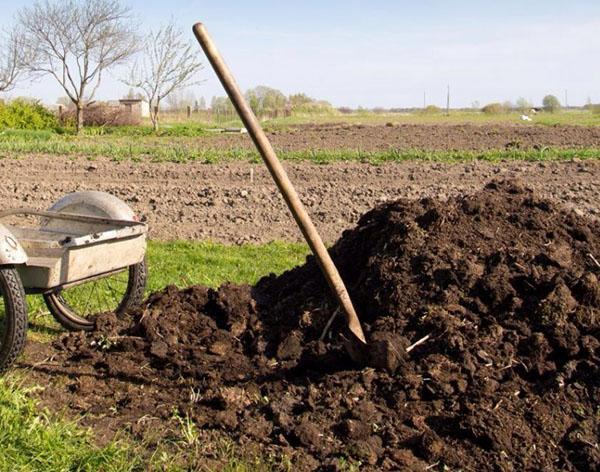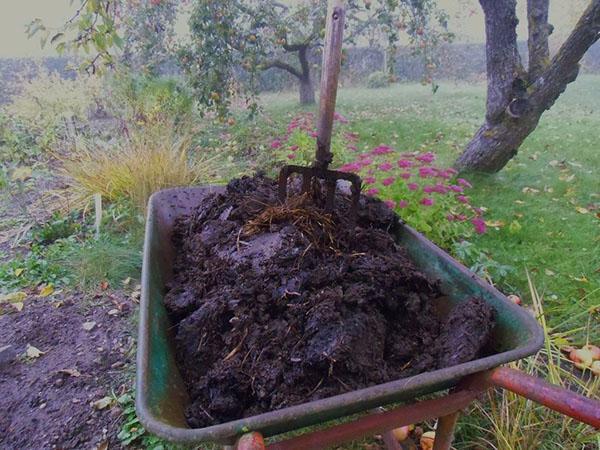How to properly use cow dung for soil fertilization
 One of the most popular organic fertilizers is cow dung. It is very effective in growing various garden crops, and at the same time it is quite affordable. Nevertheless, despite the fact that this is an absolutely natural plant food, inept use of manure can, on the contrary, destroy the crop.
One of the most popular organic fertilizers is cow dung. It is very effective in growing various garden crops, and at the same time it is quite affordable. Nevertheless, despite the fact that this is an absolutely natural plant food, inept use of manure can, on the contrary, destroy the crop.
Benefits of cow dung as fertilizer

Fertilizing the soil with mullein favorably affects the fertility of garden plants. Also, the enrichment of the land with cow dung increases the aeration of the soil, which has a positive effect on the sprinkling of the root system.
The applied fertilizer continues to enrich the soil for at least four years.
Useful substances in the composition of manure
 A kilogram of cow dung contains the following components in such quantities:
A kilogram of cow dung contains the following components in such quantities:
- calcium oxide - 2.9 g;
- nitrogen - 3.5 g;
- phosphorus oxide - 3 g;
- potassium oxide - 1.4 g
Depending on the age of the animal and its diet, the amount of useful chemical elements may slightly deviate.
Most garden fruits work well with cow dung to increase yields. And yet all plants have their own nuances when feeding with droppings.
It is used in various forms:
- fresh;
- dry substrate;
- in the form of a solution;
- granulated.
How to use cow dung as fertilizer
The rules for using cow dung depend on the degree of maturity.
Fresh litter
 The use of fresh cow manure in pure form for the purpose of plant nutrition is undesirable. This is due to the fact that fresh feces have a very high content of ammonia, which is harmful to the roots. However, fresh product is best used to fertilize the soil before winter comes.
The use of fresh cow manure in pure form for the purpose of plant nutrition is undesirable. This is due to the fact that fresh feces have a very high content of ammonia, which is harmful to the roots. However, fresh product is best used to fertilize the soil before winter comes.
Also fresh material can be used for construction warm beds... The erected half-meter in height is capable of heating the internal space up to 50aboutC. Thanks to this, the plant, planted in early spring, is protected from possible frost, and its root system begins to develop rapidly.
Sometimes fresh manure is still used to fertilize already planted seedlings, but it is worth considering the risk that the plant may die. The process of decomposition of feces involves all kinds of chemical reactions that are detrimental to the roots.
Dry substrate
 Dry humus is obtained after two years of storage. Such cow dung as fertilizer is most often the most convenient to use. It has no smell and no moisture present.
Dry humus is obtained after two years of storage. Such cow dung as fertilizer is most often the most convenient to use. It has no smell and no moisture present.  The rotten material is characterized by a free-flowing structure, and if moisture is detected during use, this indicates that the substrate is not yet mature enough for use.
The rotten material is characterized by a free-flowing structure, and if moisture is detected during use, this indicates that the substrate is not yet mature enough for use.
The convenience of using humus lies in the fact that planting of plants can begin immediately after fertilizing the soil. And due to the peculiarities of the structure of the material, its consumption is noticeably reduced.
Mullein solution, what is it

Typically, liquid cow dung concentrate is prepared from fresh material and water in equal proportions.Thus, the level of ammonia and eggs of all kinds of parasites is significantly reduced.
You need to feed the plants root watering diluted concentrate. As for how to breed a mullein for feeding, it depends on what kind of crop you need to fertilize. But, as a rule, the concentrate is diluted in a ratio of 1:10, and each plant is watered with a volume of about half a liter of the composition.
A weak mullein solution can also be sprayed on the stems of weakened plants.
Granulated manure
 The use of granular cow dung is often encountered when it is not possible to obtain the material in its natural form. However, the use of pellets has several advantages. First of all, it is convenient. Another advantage of the granules is that they can be added to the soil during spring planting without any dissolution.
The use of granular cow dung is often encountered when it is not possible to obtain the material in its natural form. However, the use of pellets has several advantages. First of all, it is convenient. Another advantage of the granules is that they can be added to the soil during spring planting without any dissolution.
Granules absorb moisture well and gradually release it into the soil. This property is very useful during the summer drought. Often, the granulated product is added to the soil during the autumn digging of the soil before wintering.
The technology for the production of granules promotes the removal of all kinds of parasites from the manure, and the biological processing of the material with further pressing.
In what situations is fertilization unacceptable
 So, it is clear that the use of fresh manure is undesirable. This can provoke the death of the plant, and the contained eggs of parasites are dangerous to human health.
So, it is clear that the use of fresh manure is undesirable. This can provoke the death of the plant, and the contained eggs of parasites are dangerous to human health.
In addition, if a white bloom appears on the droppings, this indicates the development of fungi. Turning the fresh material into humus will eliminate the problem. And yet it is categorically impossible to use such manure to create a "warm bed".
It should also be borne in mind that not all garden crops are favorable to feeding with manure. Some plants are unable to positively interact with cow droppings, these include:
- radish;
- carrot;
- beet;
- celery;
- parsley.
Planting these plants in fertilized soil is allowed a year or two after fertilization.
Self-preparation of dressings
To get a good fertilizer from cow dung, it is necessary to allocate space for storage and maturation of future compost.
Humus
 What is mullein fertilizer knows, perhaps, every gardener. To make good humus, it is important to know how to store manure. The best solution would be a suitable pit depth or an impressive box. An important condition for the preparation of the substrate is the absence of moisture and exclusion of the sun's rays.
What is mullein fertilizer knows, perhaps, every gardener. To make good humus, it is important to know how to store manure. The best solution would be a suitable pit depth or an impressive box. An important condition for the preparation of the substrate is the absence of moisture and exclusion of the sun's rays.
The manure is covered with a dense waterproof material and stored in this form for about two years. To speed up the process, it is advisable to turn the contents over with a garden pitchfork every few months.
Instructions for preparing liquid mullein
 The most common and easiest way to obtain liquid manure is to prepare a concentrate in a 1: 1 ratio of water to faeces. This liquid is stored in a tightly closed container and in a dark place.
The most common and easiest way to obtain liquid manure is to prepare a concentrate in a 1: 1 ratio of water to faeces. This liquid is stored in a tightly closed container and in a dark place.
The solution settles for about a week. During this period, ammonia is neutralized in the composition, fungal spores and parasite eggs will die. You can speed up the process by regularly stirring the composition.
Before use, the concentrate is additionally diluted with water in various proportions.
Popularity of cow dung
Due to the fact that the modern consumer is trying to buy food products grown without the use of artificial fertilizers, all farms are trying to switch exclusively to natural fertilizers. One of the most frequent decisions is the use of cow dung due to the optimal ratio of useful components in its composition.